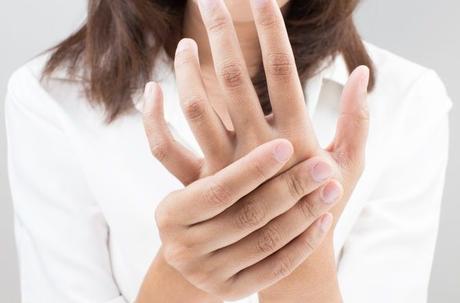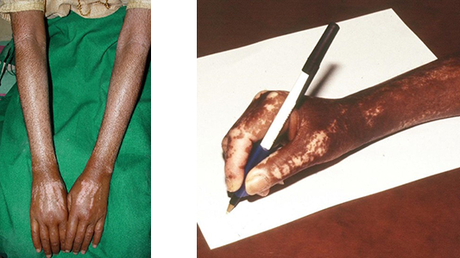Overview

According to this shloka, causes of scleroderma are:
- Improper diet and lifestyle
- Consumption of excessive spicy and salty foods
- Indigestion
- Consumption of radish, curd, meat, alcohol unhygienic foods in excess.
- Psychological factors such as anger, sleeping in the day and waking up in the night



According to this shloka Scleroderma is of two types:
Symptoms of superficial scleroderma:
Symptoms of deep scleroderma:

- Swelling and stiffness
- Hardness
- Excessive pain
- skin discoloration
- Burning Sensation
- Accumulation of pus in it
Foods we eat affect our health in several ways for worse or for better. Fruits and vegetables are beneficial for our body that provide energy and several essential nutrients. Processed foods are devoid of nutrients and if taken in a large amount, potentially harm the body, no matter what is the age or current health. When a person faces a potentially chronic disease such as scleroderma, high quality, and nutritious diet must be taken to enhance the quality of life.
The word scleroderma is derived from two Greek words " sclero" and "derma " in which sclero means hard and derma means skin.
As per Ayurveda aspect
Scleroderma is correlated with "Vatarakta". It is caused by the vitiation of Vata and rakta dosha. In this condition, there is an obstruction of vitiated Vata by the vitiated rakta. This condition starts from the foot (पाद मूल) as well as hands (हस्त मूल ) and impairment of vata (आशुकारी ) makes the spread of disease all over the body.
As per modern aspect:
It is a condition in which the body's immune system over-stimulates the collagen-producing cells that cause inflammation and an excessive buildup of collagen in the body. This leads to the hardening of skin and fibrosis of internal organs such as organs of the digestive tract, blood vessels, and lungs. The symptoms may vary from patient-to-patient.
What are the causes of scleroderma
- Overproduction and accumulation of collagen in the body tissues. Collagen is a type of protein that makes up the connective tissues of the body, including skin.
- Genetic and environmental factors are also responsible for this. (सहज कारण)

What are the types of scleroderma?
There are two main types of scleroderma:
Localized scleroderma:
It is the mild form of scleroderma. This mainly affects the skin but may have an impact on the bones and muscles.
Systemic scleroderma:
It mainly affects the whole body, including the blood and internal organs like esophagus, lungs, and heart.
What are the symptoms of scleroderma?
The symptoms of scleroderma vary for each person and the effects of it can range from mild to life-threatening. They may depend on the affected parts of the body and the extent to which they are affected.
- Hardening of skin that looks smooth and shiny. Most commonly affects the face and hands. (त्वचा का कठोर होना)
- Cold fingers that turn red, blue or white (त्वचा का रक्त, नीला या सफेद वर्ण का होना)
- Deposition of calcium in the connective tissues (ऊतकों में कैल्शियम का जमा होना)
- Sores on fingertips (उँगलियों पर घाव)
- Small red-colored spots on the face and chest region. (मुँह और वक्ष स्थल पर लाल धब्बे पड़ना)
- Swollen or painful finger and joints (उँगलियों और संधियों में शोथ)
- eyes and mouth (मुँह और आँखें सूखना)
- Muscle weakness (मांसपेशियों में कमज़ोरी)
- Diarrhea (अतिसार)
- Heartburn (हृदय में उष्णता की प्रतीति)
- Shortness of breath (श्वास कठिनता)
Diagnosis of scleroderma:
It is not easy to diagnose scleroderma. A physical examination may help. Several diagnostic tests for scleroderma
How to treat scleroderma naturally?
Onion:
Onion contains rich compounds such as cepaene and thiosulfinates that exhibits anti-inflammatory properties this will help in alleviating the symptoms of swelling, pain, and inflammation. Cut a small onion and rub it gently on the affected area and rinse it off with water after 20 to 30 minutes.
Garlic
Garlic is a medicinal herb which contains phytochemical ingredients that work as a beneficial therapeutic agent. It improves the functions of arthritis-related problems. The main function of ginger is to minimize the discomfort and reducing the pain from moderate to severe. Take two to three cloves of garlic and rub them on the affected areas. Leave it for 20 to 30 minutes and then rinse it off with water.
Turmeric:
Turmeric is a rich source of curcumin which helps in suppressing the fibrotic process. This fibrotic process leads to the overproduction of collagen and develops scleroderma. It has anti-cancer and antioxidant properties that helps in reducing inflammation at a cellular level. Mix a teaspoon of turmeric in a glass of boiled milk and drink it. You may also apply a paste of turmeric and water on the affected skin.
Lavender oil:
With its anti-inflammatory as well as analgesic properties, lavender oil helps in treating the pain as well as inflammation. This oil originates from the steam distillation of lavender flowers. Mix 5 to 6 drops of lavender oil to a teaspoon of any carrier oil. Apply it on the affected skin. Leave it for 20 to 25 minutes or overnight and then rinse it off.
Peppermint oil:
Peppermint oil contains menthol as well as rosmarinic acid. It has anti-inflammatory as well as anti-stress properties. It also manages the blood circulation and treats several symptoms related to scleroderma. Mix 5 to 6 drops of peppermint oil to a teaspoon of coconut oil and apply it on the affected area. Leave it for 20 to 30 minutes and then rinse it off.
Gotu kola:
Gotu kola is an ancient ayurvedic herb used for therapeutic purposes and is known to stabilize the connective tissues and promotes the health of blood vessels. This herb is rich in antioxidants that control the oxidation process which is associated with inflammation. With its wound healing property, it speeds up the healing process of the non-healing wounds in a shorter period of time and also useful in the management of scar. Add a teaspoon of dried Gotu kola to a cup of boiled water. Drink this tea 1 to 3 times daily.
Lemon:
Lemon contains vitamin C which is helpful in boosting the immune system. This herb enhances the effectiveness of other herbs and also effective in skin disorders. It speeds up the wound healing process and also reduces the pain as well as inflammation. Extract the lemon juice and mix a teaspoon of honey to it. Apply it on the affected area and leave it for 15 to 20 minutes and then rinse it off with water.

